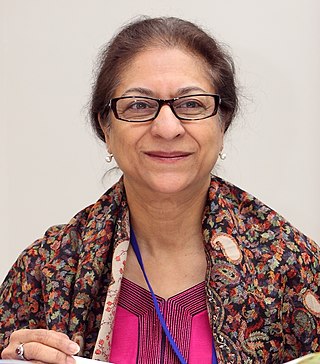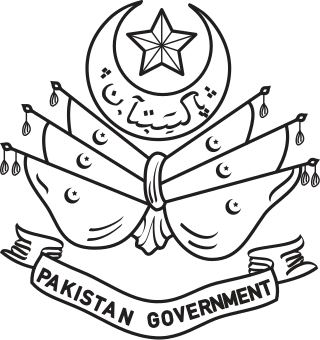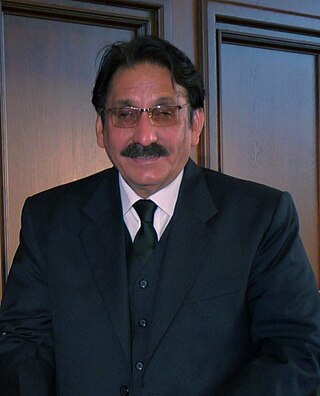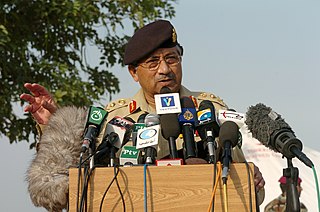
The president of Pakistan is the head of state of the Islamic Republic of Pakistan. The president is the nominal head of the executive and the supreme commander of the Pakistan Armed Forces. The presidency is a ceremonial position in Pakistan. The president is bound to act on advice of the prime minister and cabinet. Asif Ali Zardari is the current president since 10 March 2024.

The Supreme Court of Pakistan is the apex court in the judicial hierarchy of the Islamic Republic of Pakistan.

Asma Jilani Jahangir was a Pakistani human rights lawyer and social activist who co-founded and chaired the Human Rights Commission of Pakistan and AGHS Legal Aid Cell. Jahangir was known for playing a prominent role in the Lawyers' Movement and served as the United Nations Special Rapporteur on Freedom of Religion or Belief and as a trustee at the International Crisis Group.

The Constituent Assembly of Pakistan was established in August 1947 to frame a constitution for Pakistan. It also served as its first interim parliament. It was dissolved by the Governor-General of Pakistan in 1958.

Chief Justice Hamoodur Rahman, NI. HI, was a Pakistani Bengali jurist and an academic who served as the Chief Justice of Pakistan from 18 November 1968 until 31 October 1975.

Iftikhar Muhammad Chaudhry is a Pakistani jurist who served as the 20th Chief Justice of Pakistan over three non-consecutive terms from 29 June 2005 to 11 December 2013.

The 1999 military takeover in Pakistan was a bloodless coup d'état initiated by the military staff at the Joint Staff HQ working under the Chairman of the Joint Chiefs of Staff Committee and Chief of Army Staff General Pervez Musharraf. The instigators seized control of the civilian government of the popularly elected Prime Minister Nawaz Sharif on 12 October 1999. On 14 October, General Musharraf, acting as the country's Chief Executive, issued a controversial provisional order that suspended the Constitution of Pakistan.
A state of emergency was declared by President of Pakistan Pervez Musharraf on 3 November 2007 which lasted until 15 December 2007, during which the Constitution of Pakistan was suspended. When the state of emergency was declared, Musharraf controversially held both positions of President and Chief of Army Staff. He later resigned as army chief 25 days into the emergency on 28 November. The state of emergency and its responses are generally attributed to the controversies surrounding the re-election of Musharraf during the presidential election on 6 October 2007, including his holding of both offices of President and Chief of Army Staff at the time.

Athar Minallah is a Pakistani lawyer, and jurist who is serving as a judge of Supreme Court of Pakistan since 11 November 2022. Before his appointment to the Supreme Court of Pakistan, he was a judge of the Islamabad High Court for 8 years, and also served as its 5th Chief Justice from 28 November 2018 to 10 November 2022.
The Provisional Constitutional Order (PCO) is an emergency and extra-constitutional order that suspends either wholly or partially the Constitution of Pakistan — the supreme law of the land.
The National Reconciliation Ordinance was a controversial ordinance issued by the former President of Pakistan, General Pervez Musharraf, on 5 October 2007. It granted amnesty to politicians, political workers and bureaucrats who were accused of corruption, and wanted to leave country for their own profit embezzlement, money laundering, murder, and between 1 January 1986, and 12 October 1999, the time between two states of martial law in Pakistan. It was declared unconstitutional by the Supreme Court of Pakistan on 16 December 2009, saving the country from political crisis.

The Lawyers' Movement, also known as the Movement for the Restoration of Judiciary or the Black Coat Protests, was the popular mass protest movement initiated by the lawyers of Pakistan in response to the former president and army chief Pervez Musharraf's actions of 9 March 2007 when he unconstitutionally suspended Iftikhar Muhammad Chaudhry as the chief justice of Pakistan's Supreme Court. Following the suspension of the chief justice, the Supreme Court Bar Association (SCBA) declared the judge's removal as an "assault on the independence of judiciary" and was backed by several political parties.

Mian Sakirullah Jan is a former justice in Supreme Court of Pakistan and a former Chief Justice of Peshawar High Court. He is currently serving as the Chairman of the National Industrial Relations Commission.

Tassaduq Hussain Jillani is a Pakistani judge who served as the 21st Chief Justice of Pakistan from 2013 to 2014. He previously served as a justice of the Supreme Court of Pakistan from 2004, after being nominated as a justice of the Lahore High Court by Prime Minister Benazir Bhutto in 1994.

The Provisional Constitutional Order Judges case refers to cases heard and decided by the Pakistan Supreme Court pertaining to the High Court and Supreme Court judges who took their oath of offices under the Provisional Constitutional Order in 2007. On 3 November 2007, then-President Pervez Musharraf declared a Provisional Constitutional Order, which declared a state of emergency and suspends the Constitution of Pakistan. Under this emergency law, all High court judges, including the Supreme Court justices, were asked to take oath under this Provisional Constitutional Order. Those who did not were placed under effective house arrest. A seven-member bench issued a restraining order on the same day, barring the government from implementing emergency rule and urging other government officials to not help do so.

The History of the Supreme Court of Pakistan, organised by the Chief Justice of Pakistan, follows from its constitutional establishment in 1947 till its recent events. The Supreme Court of Pakistan is the highest appellate court of the country and court of last resort— the final arbiter of the law and the Constitution.
The Federation of Pakistan v. General (R) Pervez Musharraf, informally known as the Musharraf high treason case, was a court case, in which General Pervez Musharraf who acted in the capacity as chief of army staff, tried for high treason stemming from his imposing of unconstitutional state of emergency on 3 November 2007. In this act, Gen. Musharraf, who was also elected as President of Pakistan, subverted and suspended the writ of the Constitution of Pakistan, dismissing the fifteen justices of the Supreme Court of Pakistan and the fifty-six judges of the provincial High Courts while issuing arrest orders to Chief Justice of Pakistan.

Jawwad S. Khawaja v. Federation of Pakistan, PLD 2024 SC 337, is a landmark decision by the Supreme Court of Pakistan in which it was held that the Constitution of Pakistan does not allow for the court-martial of civilians.










